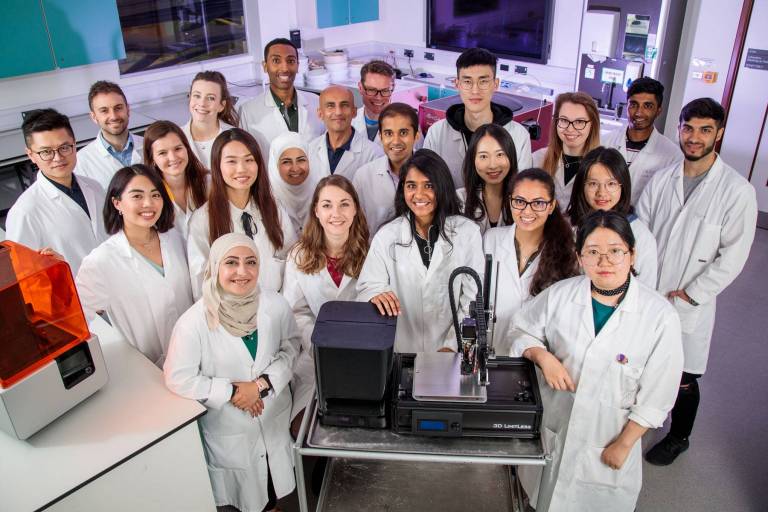Meet the Expert: Abdul Basit
26 January 2021
Abdul Basit is Professor of Pharmaceutics at the School of Pharmacy. His research focuses on drug delivery, the microbiome, 3D printing of pharmaceuticals and digital health.
Abdul leads a large and multi-disciplinary research group of PhD students and post-doctoral fellows. He is also a serial entrepreneur and has filed multiple patents, and founded the pharmaceutical companies Intract Pharma and FabRx.

We caught up with him recently to find out about more about the work he does at the UCL School of Pharmacy.
What inspired you to specialise in drug delivery and how did you get into 3D medicines?
Abdul: I’ll forever be inspired by my PhD supervisor at the School of Pharmacy, Professor Mike Newton. He gave me freedom to pursue my own interests and offered support when I needed it. Towards the end of my PhD, he actually convinced me to become an academic because he thought I was mad enough!
With the help of industrial partners, I developed a young research group to focus on what others may consider as a lacklustre organ – the colon. A close family member suffered from a gut disorder and I witnessed their deterioration first-hand due to then, the lack of appropriate treatment options. Delving into basic science shed light to the many exciting opportunities for drug delivery to the colon, and ultimately led to the invention of a new drug product for the treatment of inflammatory bowel disease.
We also acknowledged that each patient is different and sometimes require specific treatments. 3D printing of medicines brings personalised medicines from drug dose, shape and release characteristics to reality. With the support of great colleagues and friends, in particular Alvaro Goyanes and Simon Gaisford, we aim to disrupt traditional medicine manufacture and translate 3D printing of pharmaceuticals into the clinic.
What area of your work most excites you and why?
Abdul: Conducting translational research and the prospect of patients receiving better treatment and better quality of life is what truly motivates. Inflammatory bowel disease affects millions of patients worldwide. Millions more suffer from sub-optimal treatment or take medicines which could lead to toxicity due to mass manufacturing’s ‘one size fits all’ approach.
We therefore have the responsibility to conduct life-changing research to help provide patients now and in the future with effective and appropriate therapies. This is what initially propelled me to focus on developing new treatments for gut disorders. Research from the group has led to the fruition of a regulatory-approved and pharmaceutically marketed drug product for the treatment of ulcerative colitis which is transforming the lives of patients worldwide. The opportunity to also work with students, colleagues and companies continue to inspire and motivate me; it is a bi-directional process, I’m always learning from them too!
How have you adapted your approach to research during the pandemic?
Abdul: 2020 was actually the most productive year in terms of publication output for the group. We were able to take considered time to effectively write up the research papers we had previously put on standby, review articles highlighting the challenges and opportunities of colonic drug delivery, 3D printing, machine learning, sex differences and other areas of biopharmaceutics and importantly, pause to allow for creative thinking and inspiration to transpire.
Time away from the lab and office also allowed the group to not only be proficient in laboratory skills but to also home in on other key, transferrable skills such as scientific public speaking through webinars, programming courses and virtual PhD-related training.
Tell us about the some of the latest projects that your spinout companies are working on.
Abdul: We have so many exciting research projects on the go, and I’m very fortunate to have had the opportunity to work with key individuals and translate our research to two spin-out companies from UCL. Intract Pharma is working towards revolutionising oral biologics delivery. FabRx focuses on manufacturing medicines through innovative 3D printing technologies. We’re currently working on new drug delivery devices and treatments for special populations and translating these into the clinic.
What motivates you at the start of each day?
Abdul: I like to think that I’m a naturally positive person, so I don’t need much persuasion. I have an idealistic personality type, which basically means I’m disorganised and hopeless at admin, and often find myself in the wrong place at the wrong time, but with the support of wonderful colleagues and students I have managed to survive at the School for 27 years! No two days are alike. Each day brings about opportunities to either teach energetic undergraduate students or collaborate with diverse industrial partners and colleagues around the world.
What is comforting is that all who I work with are motivated towards the same goal. Whether that’s developing new drug delivery technologies, changing policies or designing medical devices, at the end, it’s for the improvement of patient lives. And for that, I’m very grateful.
I’d also like to share that I am so blessed to have the most amazing group of researchers who are all kind, talented and hardworking. Thank you all for being unapologetically yourselves and recognising that there are bigger things in the world than ourselves.
Further information:
- Professor Abdul Basit's research profile
- Intract Pharma
- Fabrx
- UCL School of Pharmacy
- UCL Faculty of Life Sciences Meet The Experts series
 Close
Close

